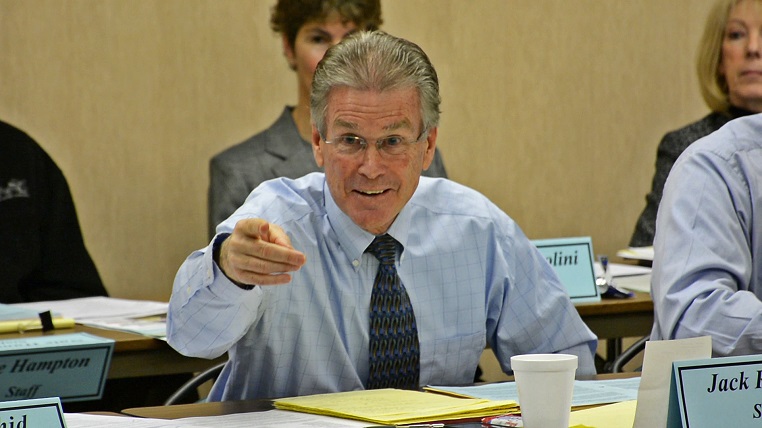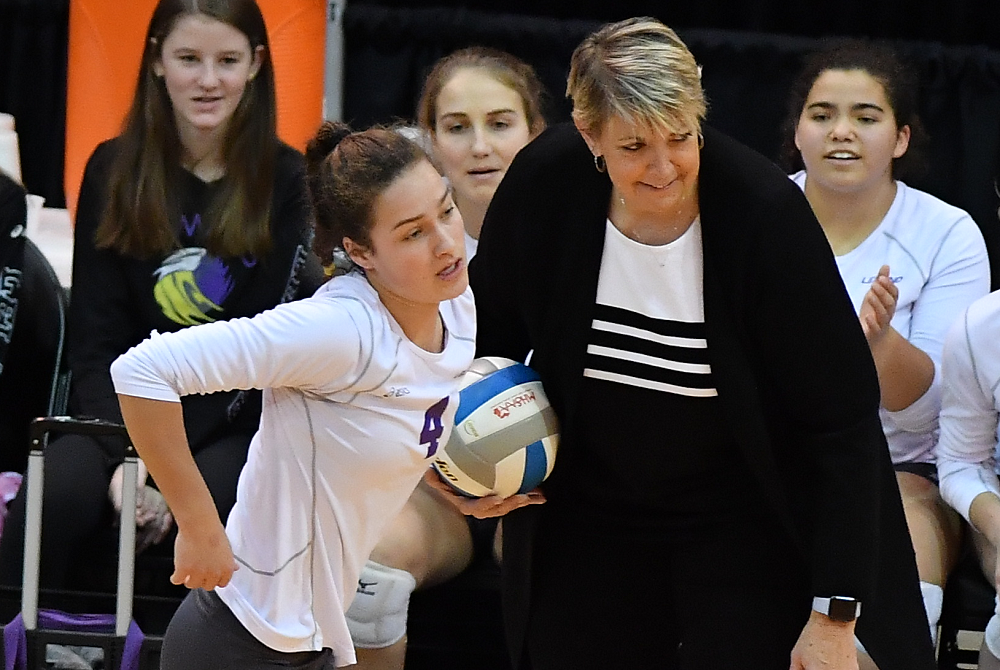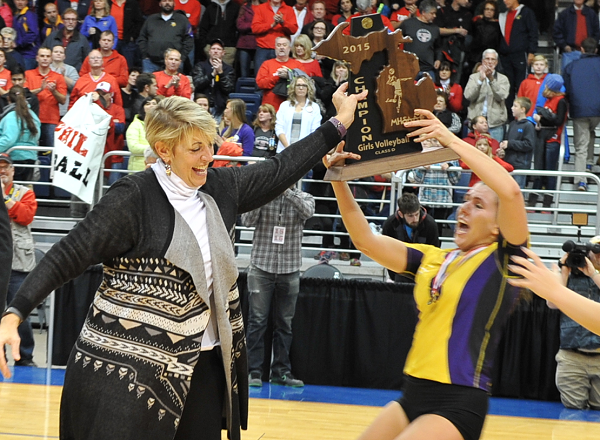
Retired MHSAA Executive Director Roberts Selected for NFHS Hall of Fame
By
Geoff Kimmerly
MHSAA.com senior editor
March 8, 2022
During an award introduction two years ago, MHSAA associate director Tom Rashid described his longtime close friend Jack Roberts as the leader who “took our darkest hours and problems and turned them into positives.”
The MHSAA has faced its share of challenging times, and those may have been among Roberts’ finest hours over 32 years as MHSAA executive director – and admittedly the times when his adrenaline flowed most. But there were many more good times and memorable advances for Michigan school sports under his leadership, and he will be recognized again this summer both for those and a lifetime of service to school sports in this state and across the nation.
John E. “Jack” Roberts was one of 12 honorees announced Tuesday as this year’s inductees into the National High School Sports Hall of Fame by the National Federation of State High School Associations (NFHS). He will be inducted as one of three former state association administrators selected for the 39th Hall of Fame class at a ceremony during the NFHS summer meeting July 1 in San Antonio, Texas.
He began his tenure as MHSAA executive director in 1986, and at the time of his retirement he was the nation’s longest-serving executive director of a state high school athletic association. He was the fourth person to serve the MHSAA in that leadership role full time, following Charles E. Forsythe (1931-42, 1945-68), Allen W. Bush (1968-78) and Vern L. Norris (1978-86).
Roberts will become the Hall of Fame’s ninth inductee from Michigan, joining Forsythe (inducted 1983), River Rouge boys basketball coach Lofton Greene (1986), Warren Regina athletic director, softball and basketball coach Diane Laffey (2000), Fennville basketball and baseball standout Richie Jordan (2001), Grosse Pointe Woods University Liggett boys and girls tennis coach Bob Wood (2005), Bloomfield Hills Cranbrook hockey standout Jim Johnson (2007), Owosso football, basketball and baseball all-stater Brad Van Pelt (2011); and Vermontville Maple Valley baseball national record holder Ken Beardslee (2016).
Roberts also follows in the footsteps of his late father, John Roberts, who served as executive director of the Wisconsin Interscholastic Athletic Association from 1957-85 and was inducted into the National High School Hall of Fame in 2000. They will be the first father-son team in the Hall of Fame.
Jack Roberts began his career serving as an assistant director for the National Federation from 1973-80. He was involved with the implementation of Title IX at the local and state levels and made immense contributions as the NFHS representative to the landmark Amateur Sports Act of 1978, and also played a significant role in the NFHS rules-writing process as the organization started writing and publishing rules for a number of new sports during the 1970s.
The MHSAA enjoyed continued growth under Roberts’ guidance, particularly in the number of Michigan students participating in athletics and in the number of MHSAA-sponsored tournament sports available to them. Several key rules changes came under Roberts’ watch and direction, and he made the MHSAA a national leader in health and safety efforts particularly in the areas of head injury care, heart safety initiatives and heat management strategies.
“I had a head start in this work. Growing up in the home of the executive director of the Wisconsin Interscholastic Athletic Association and then spending most of my 20s working for the National Federation office, and much of it with (longtime NFHS executive director) Cliff Fagan, was a jumpstart on this career,” Roberts said. “But I’m also satisfied at this point that, to paraphrase Hamilton in the musical ‘Hamilton,’ I didn’t give up on my shot. I was given a shot, I took it and I didn’t waste the chance.
“The job fit me, and I think I maxed the opportunity I had to serve educational athletics in this job, and that’s satisfying to think about at this time.”
 Under Roberts’ leadership, overall participation in high school athletics in Michigan increased 10 percent, and the MHSAA added more than 200 schools in increasing its membership by more than 15 percent at the high school and junior high/middle school levels combined. His tenure saw the addition of girls competitive cheer (1994), girls & boys bowling (2004) and girls & boys lacrosse (2005) to the MHSAA Tournament sport lineup, the creation of a separate wrestling tournament to determine champions by team format (1988), and 8-player football (2010, first playoffs 2011) as many small schools across the state began having trouble fielding 11-player teams because of enrollment and population decreases. Meanwhile, also under his leadership, the 11-player Football Playoffs expanded, doubling to 256 teams in 1999.
Under Roberts’ leadership, overall participation in high school athletics in Michigan increased 10 percent, and the MHSAA added more than 200 schools in increasing its membership by more than 15 percent at the high school and junior high/middle school levels combined. His tenure saw the addition of girls competitive cheer (1994), girls & boys bowling (2004) and girls & boys lacrosse (2005) to the MHSAA Tournament sport lineup, the creation of a separate wrestling tournament to determine champions by team format (1988), and 8-player football (2010, first playoffs 2011) as many small schools across the state began having trouble fielding 11-player teams because of enrollment and population decreases. Meanwhile, also under his leadership, the 11-player Football Playoffs expanded, doubling to 256 teams in 1999.
Among rules changes put in place during Roberts’ tenure was the addition of opportunities for multiple schools to create cooperative teams in sports where participation is lagging. He also helped Michigan become a national leader in improving sportsmanship; a comprehensive package enacted in 1996 set a statewide tone for appropriate behavior and perspective that continues to make an impact today.
Perhaps the most significant influences by Roberts came on the topics of health and safety. The MHSAA has led nationally in concussion care with its first programming in 2000 and return-to-play protocols enacted in 2010, and with mandated concussion reporting and insurance for those who suffer head injuries rolled out in 2015. A heat management policy and CPR requirements for coaches were introduced in 2013.
Also under this leadership, the first program for coaches education was launched in 1987 and evolved into the Coaches Advancement Program, with nearly 34,000 courses administered as part of CAP since 2004-05. The Women in Sports Leadership Conference was created in 1989 and remains the first, largest and longest-running program of its type in the country, regularly drawing upwards of 500 participants. The first of now-annual statewide Athletic Director In-Service Programs was conducted in 1992, and Michigan also remains a national leader in student services thanks to a variety of programs that were introduced under Roberts’ leadership.
Internally, he put the MHSAA on the leading edge nationally when it came to use the technology, especially in the realm of communications, where he put special emphasis on telling the story of school sports. “I think I was considered a conservative as to rules for eligibility and competition, and a progressive in how we delivered services to schools and school sports,” Roberts said.
In addition to his work specifically in Michigan, Roberts carried significant influence at the national level. He served as part of the NFHS Board of Directors and led the creation of the NFHS Network for video productions in 2012, serving as that board’s chairperson. He also has served on the board of directors of the National Association of Sports Officials (NASO).
“For 32 years, Jack Roberts was the epitome of what leadership looks like. He was the strongest advocate for high school sports that anyone could ever hope for,” said MHSAA Executive Director Mark Uyl, who succeeded Roberts in 2018. “He is without question one of the preeminent pioneers and difference-makers in the world of high school sports over the past 100 years.
“And other than my father, there has not been a man who has had a bigger impact and positive influence on my life personally than Jack Roberts.”
The National High School Hall of Fame was started in 1982 by the NFHS, and the rest of this year’s class is made up of athletes, coaches, administrators and an official. The 12 individuals were chosen after a two-level selection process involving a screening committee composed of active high school state association administrators, coaches and officials, and a final selection committee composed of coaches, former athletes, state association officials, media representatives and educational leaders. Nominations were made through NFHS member associations. Also chosen for this class were athletes Notah Begay (New Mexico), Walter Payton (Mississippi), Sanya Richards-Ross (Florida) and Thurman Thomas (Texas); sport coaches Ray Crowe (Indiana), Ron Kordes (Kentucky) and Lamar Rogers (Tennessee); administrators E. Wayne Cooley (Iowa) and Becky Oakes (Missouri), official Jeff Risk (North Dakota) and speech/debate coach Susan McLain (Oregon). (Click for more.)
Roberts came to the MHSAA in 1986 from the Fellowship of Christian Athletes, which he served as executive vice president. He is a 1970 graduate of Dartmouth College and taught English and coached football at high schools in Milwaukee and Denver before joining the NFHS staff.
He and his wife Peggy reside in East Lansing, and in retirement they together have increased their contributions to environmental matters and international refugee issues while both serving in leadership roles. Jack Roberts has served as board president for the Refugee Development Center in Lansing for 13 years, and Peggy Roberts served six years as chairperson of the board for Lansing’s Fenner Nature Center. As part of their environmental work, the Roberts are working within a small group of organizations to help them acquire and preserve land.

2023 WISL Award Honoree Glass Continuing to Create Leaders On Court & Off
By
Geoff Kimmerly
MHSAA.com senior editor
March 2, 2023
Hailing from one of Michigan’s smallest communities, Laurie Glass has made an impact that continues to connect all over Michigan.
But her impact on women’s athletics began long before a career that has seen the longtime Leland volleyball coach become one of the winningest in her sport in state history.
As a high school junior in 1976, she recruited seven classmates and a coach to form Leland’s first girls sports team – for basketball – and the same group then played volleyball that winter. She was a senior and major contributor when, during their second season, the Comets won the 1978 Class D volleyball championship.
More than four decades later, Glass is a Michigan legend in that sport – a winner of 1,218 matches with Leland and Traverse City Central and three Finals championships with the Comets. She’s also a nationally-recognized voice in volleyball and women’s athletics as a whole – and this year’s MHSAA Women in Sports Leadership honoree for those many and continuing contributions.
“Because I’m a teacher and coach, that’s my desire to help the youth be the best they could be. And if I can impact a coach or impact another district or program, that means I’m affecting more youth in a positive way,” Glass said. “So for me, it’s just the ripple effect; it gets a lot bigger when I’m starting little drops in other places. So I can affect the hundreds of kids that I’ve seen go through Leland, or I can impact the larger audience by impacting coaches or impacting kids in other places that can then impact other people. It allows me a wider audience for wanting to help young women to be their best young woman self in however way I can make that happen.”
Each year, the Representative Council considers the achievements of women coaches, officials and athletic administrators affiliated with the MHSAA who show exemplary leadership capabilities and positive contributions to athletics.
Leland finished 49-13 this past season and reached the Division 4 Quarterfinals. Glass has a record of 1,218-393-122 over more than three decades as a varsity volleyball coach, having led the Comets for a combined 29 seasons over three tenures, the first beginning with the 1989-90 winter season and later picking up with her most recent return for Fall 2010. She also coached Traverse City Central for four seasons beginning in 1991-92.
 Glass led Leland to Class D Finals championships in 2002, 2006 and 2015, and runner-up finishes in Class D in 2014 and Division 4 in 2018 and 2019. She was named to the Michigan Interscholastic Volleyball Coaches Association (MIVCA) Hall of Fame in 2006, and selected as national Coach of the Year in volleyball in 2014 by the National Federation of State High School Associations (NFHS) Coaches Association. She’s a three-time MIVCA Coach of the Year and was named Michigan High School Coaches Association (MHSCA) Coach of the Year for volleyball in 2015. She also was a finalist for National High School Athletic Coaches Association (NHSACA) national Coach of the Year in 2014.
Glass led Leland to Class D Finals championships in 2002, 2006 and 2015, and runner-up finishes in Class D in 2014 and Division 4 in 2018 and 2019. She was named to the Michigan Interscholastic Volleyball Coaches Association (MIVCA) Hall of Fame in 2006, and selected as national Coach of the Year in volleyball in 2014 by the National Federation of State High School Associations (NFHS) Coaches Association. She’s a three-time MIVCA Coach of the Year and was named Michigan High School Coaches Association (MHSCA) Coach of the Year for volleyball in 2015. She also was a finalist for National High School Athletic Coaches Association (NHSACA) national Coach of the Year in 2014.
Glass has spoken multiple times at the MHSAA Women In Sports Leadership Conference and several times at the MIVCA Coaches Clinic, and among various other engagements was the featured speaker at the Nebraska Athletic Association Coaches Clinic. She will receive the Women In Sports Leadership Award during the MHSAA Division 1 Girls Basketball Final on March 18 at Michigan State University’s Breslin Center.
“Laurie Glass is recognized most on the statewide level for leading one of the most successful volleyball programs in state history. But she is known among her peers most for the way she teaches not only volleyball but life skills to her athletes,” MHSAA Executive Director Mark Uyl said. “Her leadership creates more leaders, be they the athletes who have the opportunity to play for her or the coaches who learn from her and receive her mentorship.”
Glass’ roots are in one of the most accomplished athletic families in Michigan high school history.
Her father Larry Glass coached Northwestern University’s men’s basketball program from 1963-69, and later took over the Leland girls basketball program and led the Comets to a 388-110 record and three straight Class D Finals championships (1980-82) over two tenures from 1977-91 and 2000-05. Laurie’s sister Rebecca McKee played basketball at Leland and Michigan State University, and her brother Michael Glass played basketball at Lansing Community College before also becoming a high school and college coach.
Laurie also coached and parented arguably the most accomplished volleyball player – and perhaps top female athlete across all sports – in Michigan high school history. Her daughter Alisha Glass-Childress graduated from Leland in 2006 with national records for career kills, aces and blocks, and the first two still top those respective lists. Alisha, also an all-state basketball player, went on to star on the volleyball court at Penn State and as the U.S. Olympic team setter in 2016 in helping that team to the bronze medal.
Larry Glass’ lessons still ring true as Laurie passes them on to another generation. One of her favorite sayings from her father was “you can’t take money out of the bank until you put money in” – in essence, a coach can’t expect athletes to accept criticism or a hard ask if that coach first hasn’t invested in them. Another of her dad’s themes involved making sure players learned fundamentals at young ages and improved on them at all levels, whether they won games or not during those early years. As one of his middle school coaches, that stuck with her, and it remains a basic component of her coaching.
“I’ve always said that we compete with teams that are way more athletic, have all the things on paper that should beat us. And the fact that we know how to be a really good team is what allows us to beat people who on paper should be better than us,” Laurie Glass said. “I’ve always valued the time spent on culture and team because that’s the advantage we hold. We’re never going to be the tallest or most talented – Alisha being the anomaly, of course.”
Laurie Glass has served on the MIVCA Executive Board, including as president, and is a member of the MHSCA and American Volleyball Coaches Association (AVCA). Locally, her program annually hosts the Forever Dig Abby match in honor of former player Abby Gross, who died after a fight against cancer in 2015. Proceeds most years go to benefit another community member battling the disease, and this past season went to a fund for efforts related to ovarian cancer.
Glass has served nearly 35 years in education and retired from her duties as a behavior intervention specialist and special education teacher in the Traverse Bay Area Intermediate School District in 2019. She has returned to the school setting, however, and is in her second year as a behavior intervention specialist at Leland.
Glass earned a bachelor’s degree in special education with an endorsement in emotional impairment from Western Michigan University in 1988, and has done master-level coursework in education administration and technology. She also is a certified instructor for the Crisis Prevention Institute. Glass first attended Grand Valley State University and played a season of volleyball before transferring. (NOTE: Glass also coached the Kalamazoo Central varsity for two seasons during the mid-1980s. Those records are unavailable currently but will be added to her overall record when research is complete.)
Past Women In Sports Leadership Award Winners
1990 – Carol Seavoy, L’Anse
1991 – Diane Laffey, Harper Woods
1992 – Patricia Ashby, Scotts
1993 – Jo Lake, Grosse Pointe
1994 – Brenda Gatlin, Detroit
1995 – Jane Bennett, Ann Arbor
1996 – Cheryl Amos-Helmicki, Huntington Woods
1997 – Delores L. Elswick, Detroit
1998 – Karen S. Leinaar, Delton
1999 – Kathy McGee, Flint
2000 – Pat Richardson, Grass Lake
2001 – Suzanne Martin, East Lansing
2002 – Susan Barthold, Kentwood
2003 – Nancy Clark, Flint
2004 – Kathy Vruggink Westdorp, Grand Rapids
2005 – Barbara Redding, Capac
2006 – Melanie Miller, Lansing
2007 – Jan Sander, Warren Woods
2008 – Jane Bos, Grand Rapids
2009 – Gail Ganakas, Flint; Deb VanKuiken, Holly
2010 – Gina Mazzolini, Lansing
2011 – Ellen Pugh, West Branch; Patti Tibaldi, Traverse City
2012 – Janet Gillette, Comstock Park
2013 – Barbara Beckett, Traverse City
2014 – Teri Reyburn, DeWitt
2015 – Jean LaClair, Bronson
2016 – Betty Wroubel, Pontiac
2017 – Dottie Davis, Ann Arbor
2018 – Meg Seng, Ann Arbor
2019 – Kris Isom, Adrian
2020 – Nikki Norris, East Lansing
2021 – Dorene Ingalls, St. Ignace
2022 – Lori Hyman, Livonia
PHOTOS (Top) Leland coach Laurie Glass confers with one of her players during the 2019 Division 4 Final at Kellogg Arena. (Middle) Glass passes the championship trophy to her team after the Comets won the 2015 Class D title.

